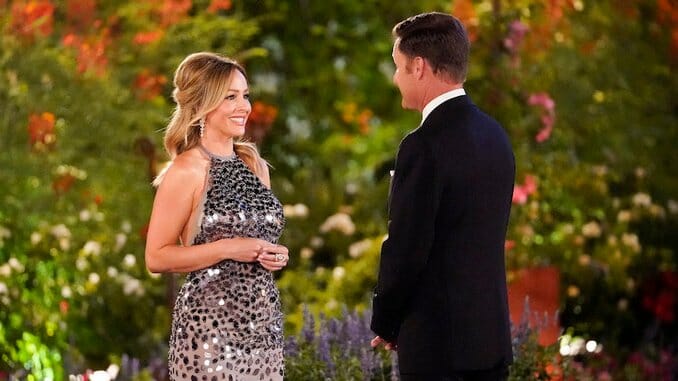On The Bachelor and Bachelorette, Age Is Always a Number
Photos Courtesy of ABC TV Features The Bachelorette
The newest season of The Bachelorette opened up with early teasers of current lead Clare Crawley dramatically correcting a contestant’s comment of expecting more from the oldest Bachelorette. “I don’t care what I’ve done. Guess what? I’m the oldest Bachelorette, that’s 39, that’s standing here, that’s single, because I didn’t settle for men like that,” she spills.
Crawley is indeed 39, and is indeed the oldest Bachelorette in the show’s history. Unsurprisingly, within that history are double standards for the way age and relationships are discussed. Potentially reflective of real-life societal views, the franchise tries (and fails) to be progressive, but still propels an old-school way of thinking about how we date.
The Bachelorette currently has a cast of eligible men whose ages range from 26 to 40 years old. Yet, Crawley’s main criticism comes from her being too “old” for the show, rather than the men being too young. Society and the show continue to perceive men—whether they are young or older—as the dominant role in a relationship, even if there is an equal balance between the two partners.
Truthfully, I take partial issue with the discussion society and television presents about age because I see pieces of Crawley in my own mother. My mother, after remarrying in circa 2005, had two more children with a partner who was born in 1981. Her birth year was 1973. Nobody questioned his readiness to choose to be in a relationship. And while my mother didn’t face nearly as much criticism as Crawley, the “cougar” jokes were definitely there—even from my younger brother and I. Yet, as I’ve gotten older, I’ve come to realize that the jokes and deeming it as taboo is an unfair judgement towards both age and gender. (Sadly, not everyone has had that revelation.)
I do understand that there are large age gap relationships between people that can be representative of harmful power dynamics. However, condemning every connection presented between two legally consenting people—on the show and in real life—just because of two varying dates of birth isn’t the way to move forward with healthy relationship discourse.
It’s also interesting that while society appears to trust young men as capable of making their own decisions when it comes to dating, young women—as The Bachelor presents it—are not. Nobody questions the readiness of Clare’s younger men. When reversed, though, the question goes more towards appropriateness.
Arie Luyendyk Jr.’s season of The Bachelor aired in 2017—three years before Crawley’s, but serves as a perfect point of comparison. (Luyendyk is also the same age as Crawley now, though was 36 during his run as The Bachelor lead.)
“How Old Are Arie’s Final Three Girls?” and “The Bachelor’s Arie Luyendyk Is a Decade Older Than the Average Female Contestant” were average headlines during his Bachelor run, while a simple search of “Clare Crawley Age Gap” doesn’t share the same discourse. Both leads were criticized as talking points for their ages as a part of the show, yet for Crawley it came from the men on the cast, rather than the Luyendyk-focused public media think pieces.
The main center of Luyendyk’s season controversy was his relationship with contestant Bekah Martinez, who was 22 years old at the time of signing up for the show. Martinez was perceived as someone that wasn’t ready for a real relationship because she was the youngest cast member, while the other women on the show didn’t pass the same criticisms on to those who were 23 in the house.
When applying for any Bachelor season, the minimum age requirement is 21—just given drinking plays a role in the series. Beyond that, there shouldn’t be a barricade when it comes to finding love, when being in a general under-40 dating group isn’t an unusual thing.
The show presents Martinez as too young, Crawley as too old. But the criticisms shouldn’t be about age, rather, maturity level. Especially since many of the older contestants (both men and women) can be focused on inciting drama within the house.
On Colton Underwood’s 2019 season of The Bachelor, contestants upheld these ideas of ageism with one another. Demi Burnett was 23 and Tracy Shapoff was 31, yet they both passed judgements based on each person’s “number” as a basis for drama. Burnett placed Shapoff in the “cougar club,” while Shapoff refers to Burnett as “literally a child.”
Recent seasons of the show focus a lot on age as a number when it comes to the judgement of women specifically, despite census data putting the majority of cast members in the common age range for marriage. And yet anyone falling outside of that is prone to harsh criticism both from other contestants and from fans.
The Bachelor franchise walks a very strange tightrope in the way it discusses age, but it is still, unfortunately, incredibly on par with how people discuss variations in relationship contexts more generally. In recent years, the series has made attempts to become more “progressive,” between casting Matt James as the first Black Bachelor lead to portraying same-sex couples on screen.
Yet, when it comes to the way different positions of age dynamics are presented, it’s something that needs to be addressed more specifically and positively—especially regarding the show’s women like Clare Crawley—to actually change.
Lexi Lane is a Brooklyn writer with a love of iced coffee, reality TV, and the good old days when concerts existed. She is currently a music intern at Paste, but dabbles in other sections too. You can find her (and great memes) on Twitter@lexixlane.”
For all the latest TV news, reviews, lists and features, follow @Paste_TV.